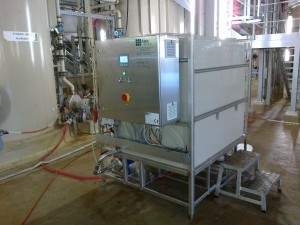Wastewater from exhaust gas treatment in coal power stations
Flue-gas or exhaust gas desulfurization systems (“scrubber systems”) creat a constant stream of wastewater with high content of suspended solids, salts and heavy metals. Strict limits for heavy metals for wastewater discharge challenge coal power stations increasingly. This applies to both hard and brown coal power plants. The traditional treatment process consisting of flocculation / precipitation, settling and cake filtration (filter press) nowadays often don’t suffice in order to comply with the limits. The power stations are threatened with having to shut down operation so they don’t exceed the annual heavy metal load of the discharged water.
The heavy metals (e.g. mercury, cadmium, copper,…) are attached to fine suspended solids to a large extent. These particles can’t be removed by traditional treatment steps sufficiently. Depending on the used coal, the characteristics of the scubber wastewater regarding salinity, pH and heavy metal concentration varies. This makes a stable chemical pretreatment difficult.
Solution: Membrane filtration with ceramic membranes
These suspended solids can be removed reliably and without any chemical pretreatment through membrane filtration. Membranes in the range of ultrafiltration are most suitable for this task.
Since October 2017 an Atec pilot unit runs successful long-term tests at a hard coal power station. This membrane filtration system is equipped with robust ceramic ultrafiltration membranes. In close cooperation with the customer, different operating and cleaning procedures were tested and by that the neccessary knowledge and data for an investment in a full-scale plant were created.
Now Atec received an order for another pilot unit by another coal power station with a similar task in scrubber wastewater treatment. The start of the long-term tests is planned to be end of 2018.

Membrane filtration unit for treatment of wastewater from flue-gas scrubber in a coal power station
